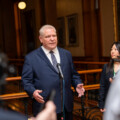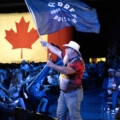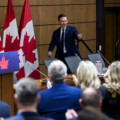The trucker protest against COVID-19 vaccine mandates that gridlocked Ottawa and closed key Canada-U.S. border crossings is a sign of the complete breakdown of our political conversation,“As the trucker protest continues in downtown Ottawa, nearly half of Canadians say they agree with the frustration of the protesters but disagree with their behaviour, according to an opinion poll conducted over the weekend for The Hub. Fifteen percent of Canadians strongly agree and 33 percent somewhat agree that they don’t like the protesters’ behaviour but understand their grievances, according to the survey designed by Public Square Research and Maru/Blue. Canadians are also getting frustrated with the public discourse on the restrictions brought about by the COVID-19 pandemic. Sixty-five percent of Canadians agree that ‘it’s been hard to have a conversation about COVID-19 without people getting mad.'” https://thehub.ca/2022-02-08/half-of-canadians-think-the-trucker-protest-is-behaving-badly-but-understand-their-frustration-poll/ said former Liberal Party leader Michael Ignatieff.
“Why the hell did we get to a situation in which hard working men and women in Canada felt so alienated that they had to shut down the capital of our country for three weeks? How do we get here?” said Ignatieff, speaking to The Hub‘s editor-at-large Sean Speer on an upcoming episode of the Hub Dialogues podcast.
“It doesn’t excuse what they did, I felt that police action had to be taken to clear the thing but, boy, it’s an indictment of the failure of liberal democracy,” said Ignatieff.
Ignatieff is an internationally renowned intellectual who was leader of the Liberal Party from 2008 to 2011,“Ignatieff tried to orient the party in a more fiscally conservative direction while preserving social programs that had been the hallmark of the Liberal tenure in the majority. As Canada was largely spared the hardships of the global financial crisis, however, Conservatives retained the momentum on economic issues. In March 2011 a parliamentary committee found the Conservatives in contempt for failing to release budgetary information, and Ignatieff sponsored a no-confidence vote that brought down the Harper government.” https://www.britannica.com/biography/Michael-Ignatieff before resigning and sparking the leadership race that put Justin Trudeau at the helm of the party. Until last year, he was president and rector of the Central European University in Budapest.
Ignatieff argued that Canadians are sometimes too conflict-averse to hash out the usual tensions and endure the difficult conversations required in a liberal society, allowing grievances to fester.
“We are very, very highly segmented by race and ethnicity, and by region, and liberalism welcomes pluralism. But it’s not clear that we are communicating to each other very well,” said Ignatieff. “The Canadian problem is that we’ve decided the solution to this problem is to be very, very nice and avoid saying anything that stirs anybody up.”
Whether it’s First Nations blockades about pipeline infrastructure“The 2020 Canadian pipeline and railway protests were a series of civil disobedience protests held in Canada. The main issue behind the protests was the construction of the Coastal GasLink Pipeline (CGL) through 190 kilometres (120 mi) of Wetʼsuwetʼen First Nation territory in British Columbia (BC), land that is unceded. Other concerns of the protesters were indigenous land rights, the actions of police, land conservation, and the environmental impact of energy projects.” https://en.wikipedia.org/wiki/2020_Canadian_pipeline_and_railway_protests or the trucker protests, Ignatieff argued that these protests demand a response from governments and Canadians whether they like it or not.
“A lot of people don’t like that about liberal democracy, they want a quiet life, they wonder ‘why can’t we all get on?’ Well, the core of a democratic society is contention, argument, debate. And our job is just to keep it from being violent,” said Ignatieff.
Ignatieff also argued that a liberal society should insist on treating people as individuals, rather than relegating them to identity groups.
“A liberal thinks the world is made up not of races, genders, classes, it’s made up of individuals, and human beings matter. They matter one by one,” said Ignatieff. “A liberal puts freedom first, puts freedom ahead of equality, puts freedom ahead of solidarity.”
This differentiates liberals from socialists and social democrats, he argued, and it also differentiates liberal from conservatives because “freedom means changes,” which puts less emphasis on tradition and the past.
With the Russian invasion of Ukraine reaching nearly a month of bloody fighting, Ignatieff said it should refocus our thinking on how valuable liberal democratic freedoms and institutions are to the West. The world’s liberal democracies are now facing “world historical competition” from countries like China and Russia, which should remind people how fragile the current order is, argued Ignatieff.
“If you’ve need a little refresher on how non-boring liberal democracy is just listen to Volodymyr Zelenskyy,” said Ignatieff. “We better know what the hell we believe and what the hell we’re prepared to defend.”
His new book On Consolation: Finding Solace in Dark Times contains a series of essays about how great figures in history searched for solace while facing tragedies. Arguing that “the language of consolation has largely vanished from our modern vocabulary” in a secular world, the book tries to help people console themselves and each other in an increasingly less religious age.
“The worst and the hardest thing about suffering and loss and grief is that you feel you’re going through it alone. And I’ve written this book, just to show people that there are so many resources, partly religious, partly secular, that you can turn to when you go through these experiences,” said Ignatieff.
Recommended for You

Ontario’s Progressive Conservatives need a wake-up call

From Jordan Peterson law to bail reform: 9 policy proposals from the Conservative convention that could spur Canada’s comeback

‘A delicate balance’: Why the Conservative convention is a crossroads for the party

Everyone’s managing decline. I’m exploring a run for Ontario Liberal leader to fight for growth



